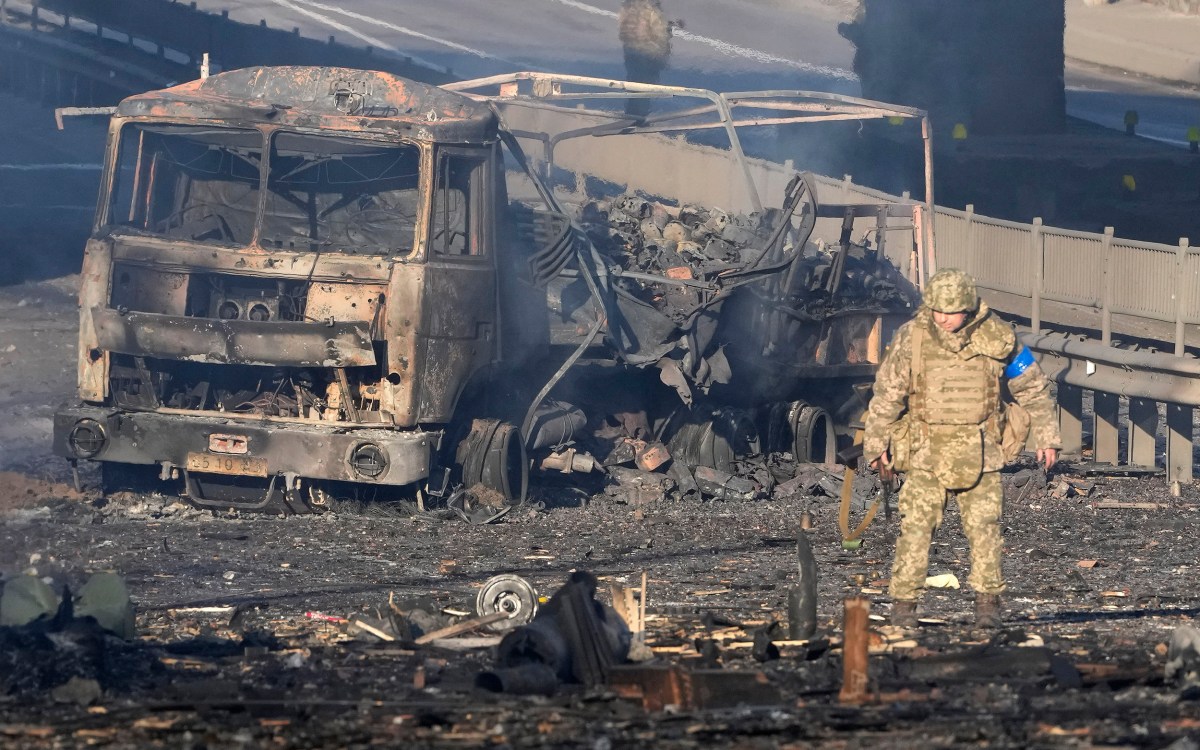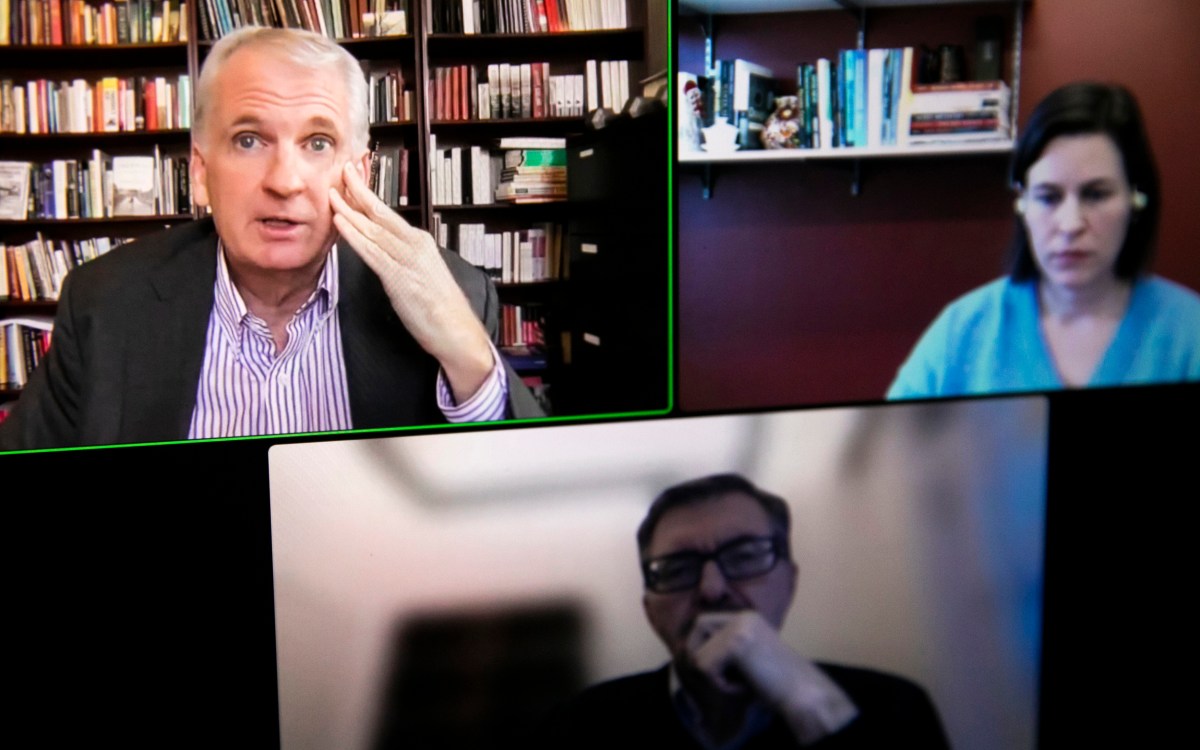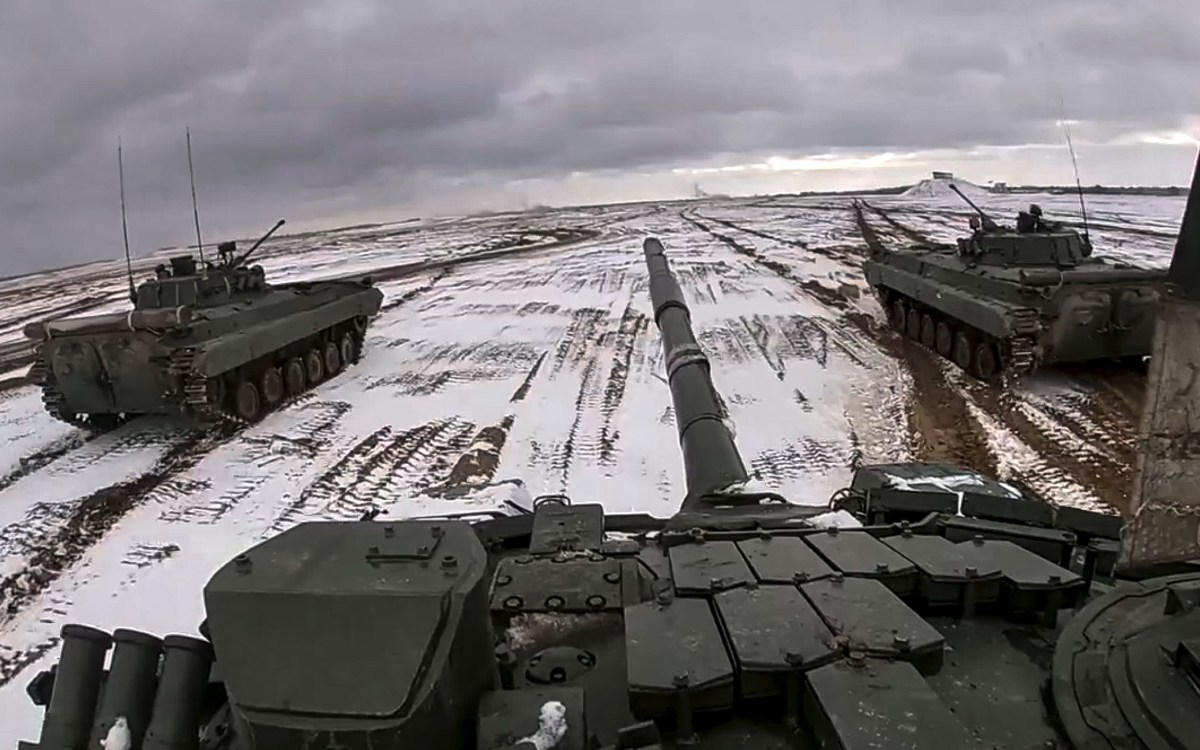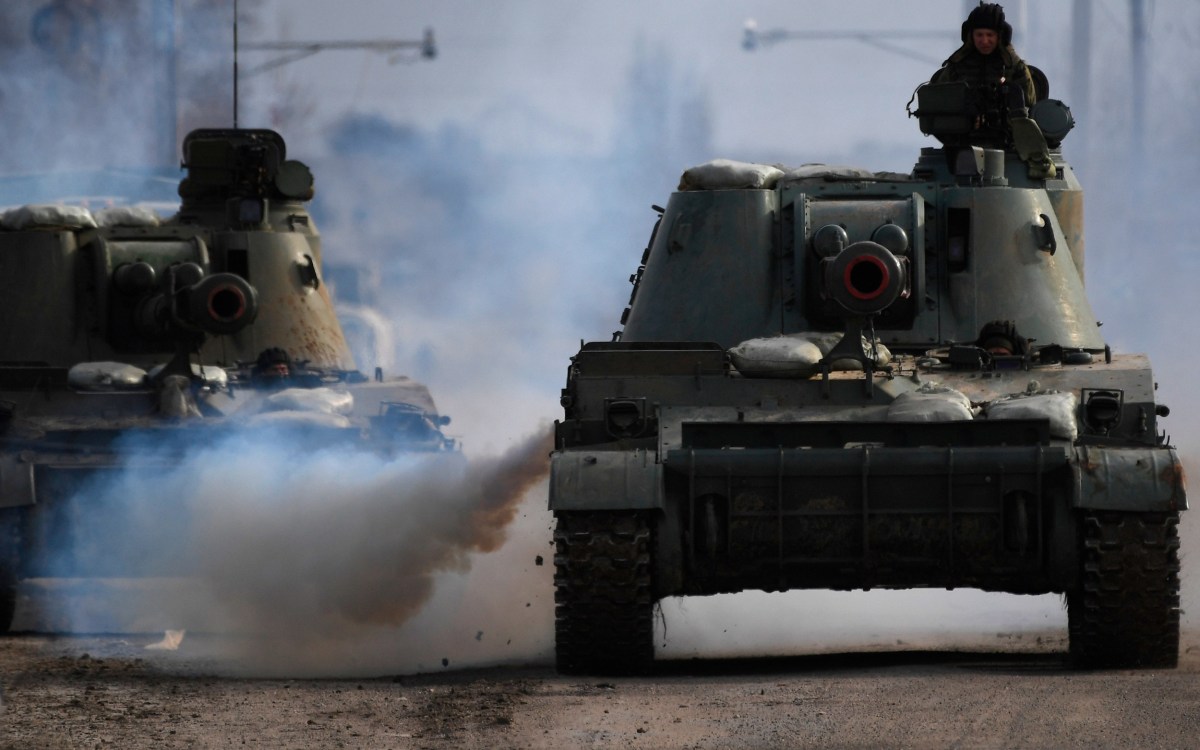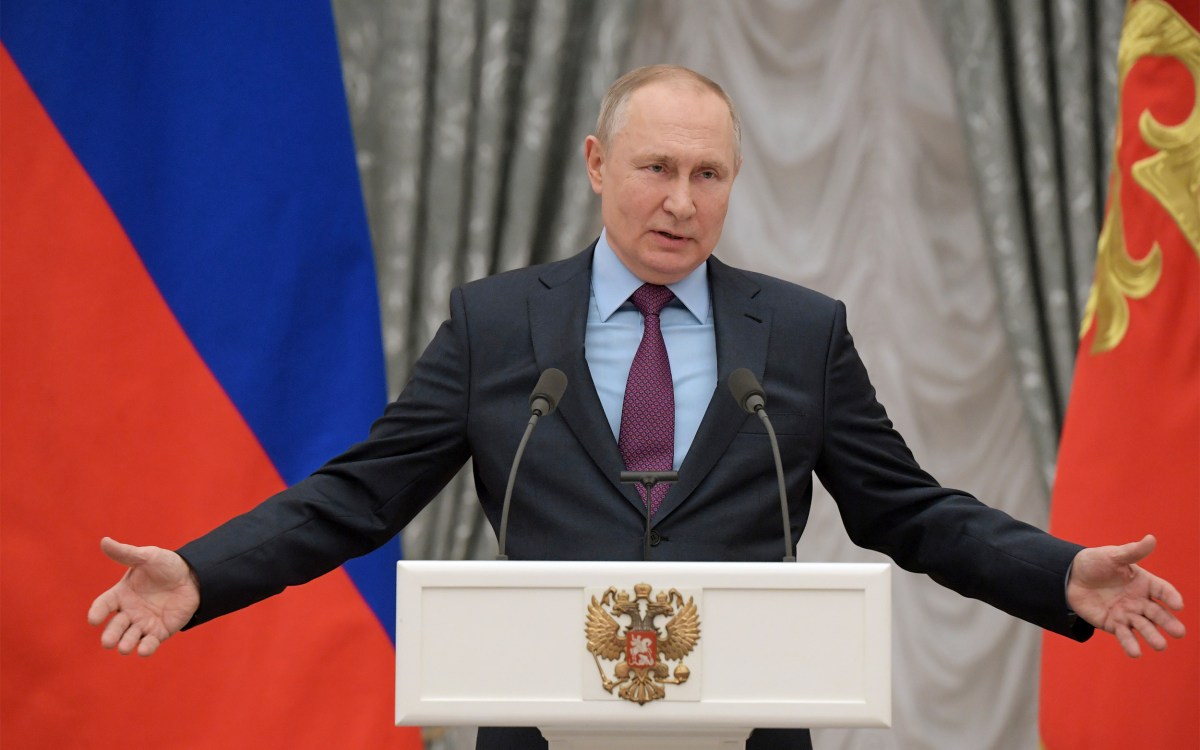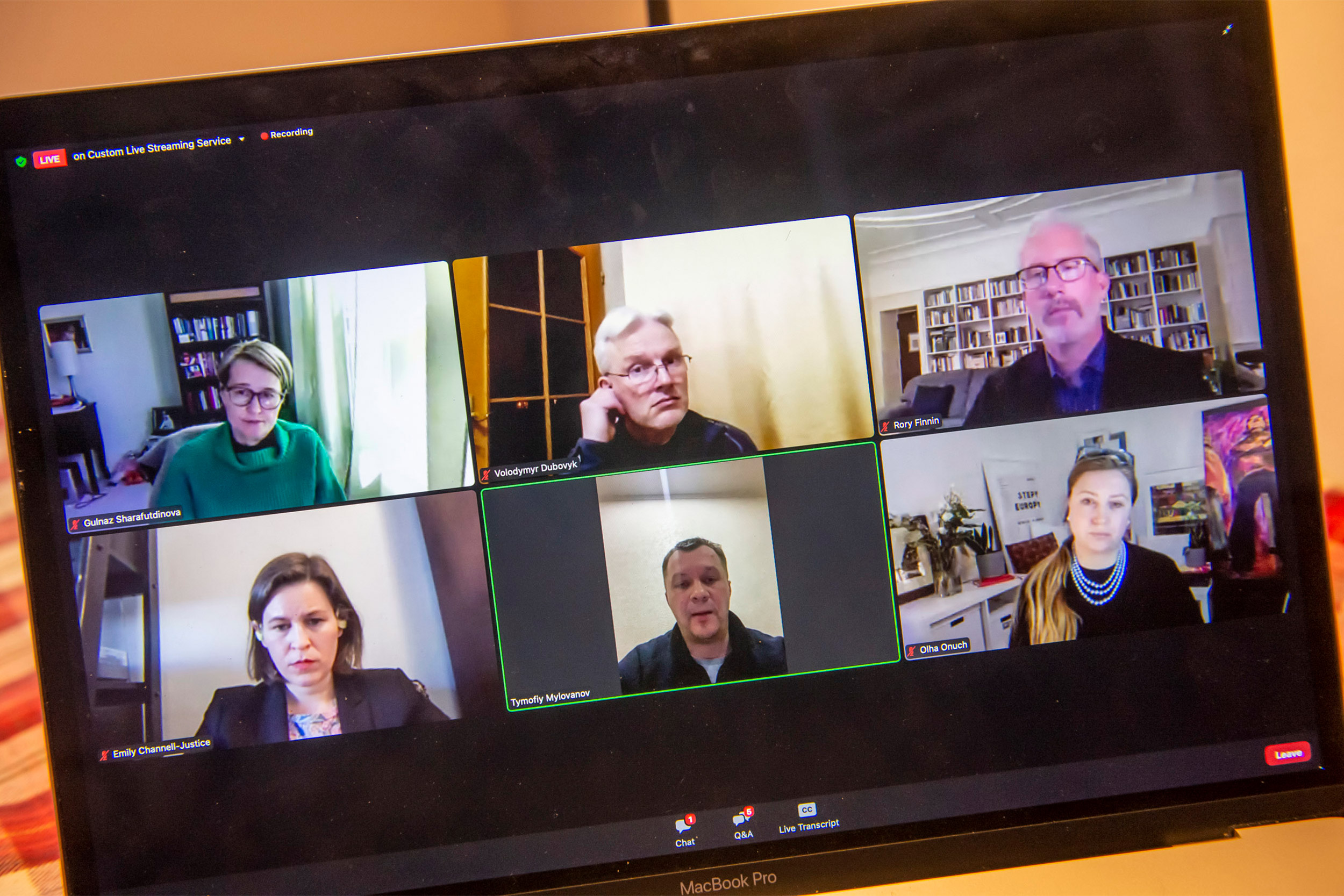
Ukraine and Russia experts shared their views during “Ukraine Under Attack.” Panelists included Gulnaz Sharafutdinova (clockwise from upper right), Volodymyr Dubovyk, Rory Finnin, Olha Onuch, Tymofiy Mylovanov, and moderator Emily Channell-Justice.
Jon Chase/Harvard Staff Photographer
Scholars inside Ukraine describe country determined to fight back
Panelists in Harvard discussion praise Zelensky and urge support for communities under attack
On Monday, an international group of experts on Ukrainian and Russian politics, history, and economics convened for a Harvard panel focused on the Russian invasion of Ukraine.
“Ukraine Under Attack” was moderated by Emily Channell-Justice, director of the Temerty Contemporary Ukraine Program at the Ukrainian Research Institute at Harvard University.
Five scholars — two of whom joined the conversation from Ukraine — answered questions collected by event organizers and submitted from audience members. Topics included the use of language in media coverage of the invasion, why the invasion happened when it did, and the lived experiences of Russians and Ukrainians.
Rory Finnin, an associate professor of Ukrainian studies at the University of Cambridge, began the discussion by providing some context about the formation of Ukrainian national identity and how the country’s values of freedom and anticolonialism have emerged during the invasion.
“We’re seeing that, like any country these days, there are divisions [in Ukraine], but it’s united in all the right ways,” said Finnin. “Its sense of self — its political character — is clear. And when we take all this on board, we can see that in the realm of political values, Ukraine is not any cousin of Russia. It’s Russia’s competitor.” Given this history, Finnin said, “Vladimir Putin’s claim that Ukrainians and Russians are a single one people, a single whole, is completely false and ahistorical.”
Addressing the timing of the attack, Ola Onuch, a senior lecturer in politics at the University of Manchester, pointed to what she called “structural factors” — including the Kremlin’s gathering of financial resources since 2008 — and “actor-based reasons” for the invasion. She also highlighted Putin’s possible miscalculation of the Ukrainian people’s connection to their president, Volodymyr Zelensky.
Tymofiy Mylovanov, the former Minister of Economic Development, Trade, and Agriculture of Ukraine and president of the Kyiv School of Economics, spoke of Zelensky’s tough stance with Russian and Ukrainian oligarchs and his refusal to stand down against Putin as factors in the decision to invade and the Ukrainian resistance. “He is a very proud person,” said Mylovanov, who joined the panel from Kyiv. “And I am proud that he acts like that.”
When asked if they saw an “off-ramp” for the war or a positive turning point in Monday’s talks between envoys from the two nations, the panelists painted a grim picture.
“Both sides are still ready to fight,” said Volodymyr Dubovyk, an associate professor of international relations at Mechnikov National University, who joined the conversation from Odessa. “We’re going to see more war.”
“This is a game of testing, where everyone is testing each other on multiple fronts: diplomatic, economic negotiation, and military,” added Mylovanov. “It’s pretty heavy testing. But unfortunately, it will have to be worked out in the field.”
Gulnaz Sharafutdinova, a professor of Russian Politics at King’s College London, said Putin’s use of “de-Nazification” as a means to justify the invasion was “fake news” and “suggests that they are not serious about reaching compromise at this point.” Looking ahead, she called for greater scrutiny of China and its ties with Putin. “The global media attention needs to create pressures on the Chinese president to enter with a very specific stabilizing role.”
The panelists also spoke of war’s toll on everyday Ukrainians trying flee the invasion, stay safe from bombing, or fight back, with Dubovyk praising Zelensky for rallying the country with his courage and resolve. “A lot of people who never voted for him, didn’t really like him — much like myself, I should say — we see him as a leader of our nation right now,” he said. “He’s showing up, he’s sending a great signal to the people. He’s not leaving.
“So it’s not about him anymore. It’s about the country. We’re not willing to let it go,” he added.
More like this
In his opening remarks, Harvard President Larry Bacow offered support to the people of Ukraine and thanked the panelists for gathering to discuss the crisis.
“Universities are built to bring people together, and technology has increased our capacity to draw audiences from around the world,” he said. “This gathering exemplifies our convening strength — and its tremendous value.”
“Harvard will continue to support in whatever ways we can members of our community who face grave uncertainty,” he added. “We will continue to share knowledge of Ukraine and advance understanding of its culture, history, and language. And we will continue to speak against cruelty, and to act with compassion as we hold to hope for resolution — and for liberation.”
The panelists also offered emotional pleas to people not directly connected to the war — including the almost 8,000 viewers who watched the event on Zoom or YouTube — not to forget about the ordinary Ukrainians whose lives have been upended by the invasion.
“All of us here in the U.K., in the U.S., we all have to buckle in for a long conflict, and we have to explain to our friends and our colleagues that if prices go up at the gas station, there’s a reason for that, and it’s a moral reason,” said Finnin. “This is a fight, truly, of liberal democracy against an authoritarian war criminal.”
“Keep Ukraine in your minds, and send support messages,” added Dubovyk. “We want to feel that we are not abandoned, that we’re not alone.”
HURI was the organizer and primary sponsor of “Ukraine Under Attack.” The event was co-sponsored by Harvard’s Davis Center for Russian and Eurasian Studies, the Havighurst Center for Russian and Post-Soviet Studies at Miami University in Ohio, and the Melikian Center: Russian, Eurasian, and East European Studies at Arizona State University.



